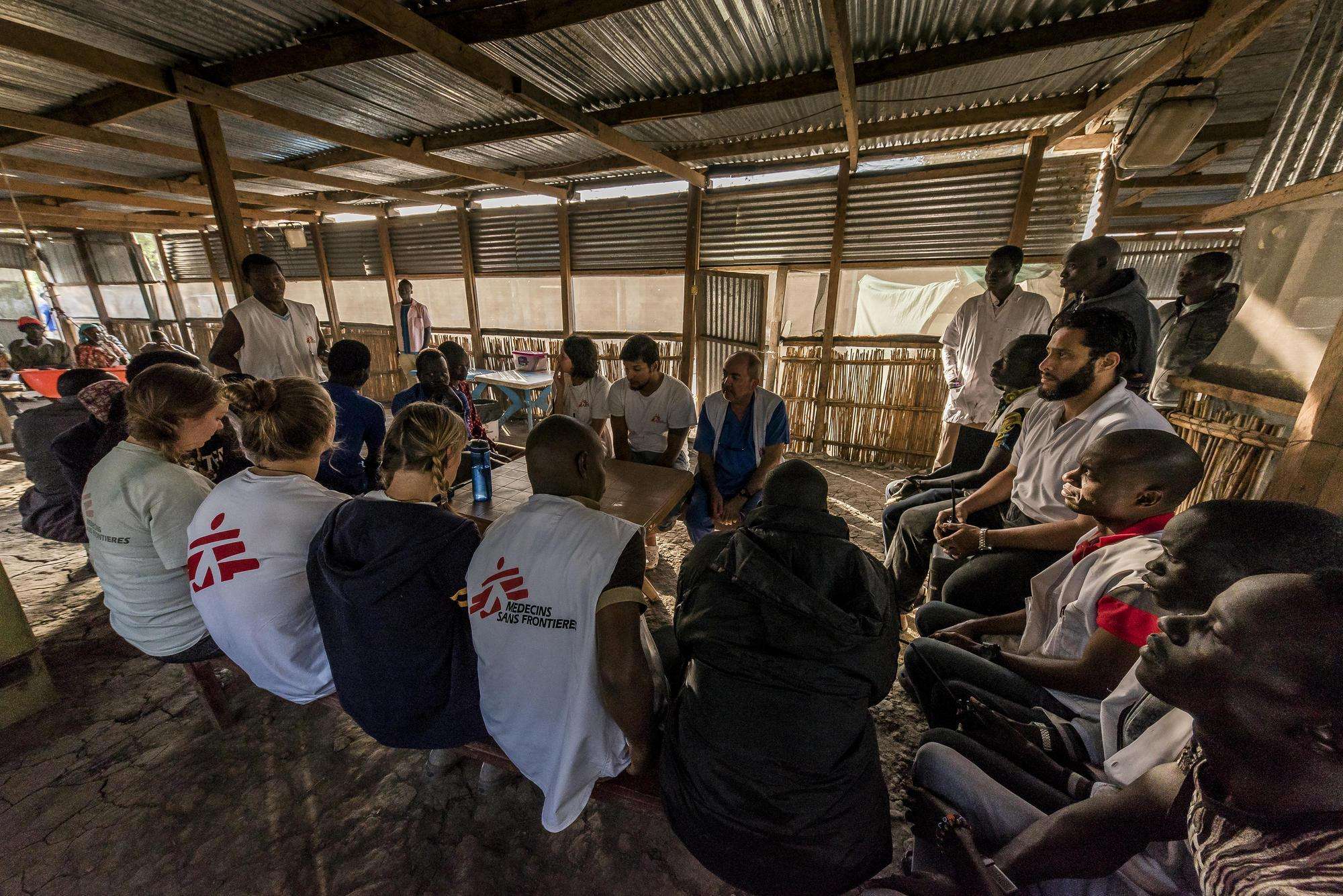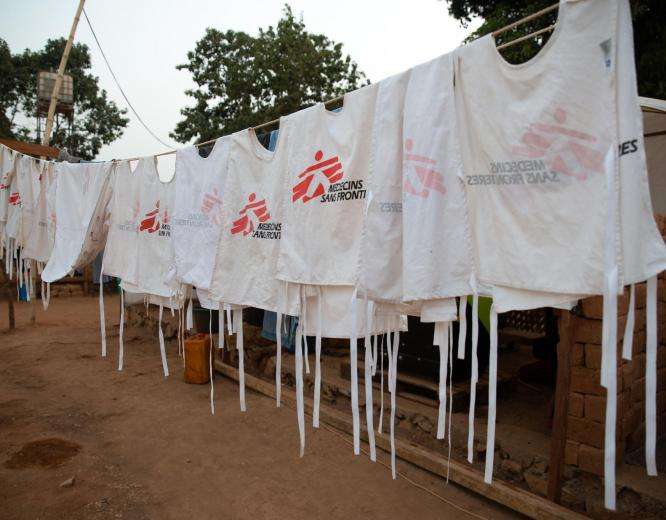Upholding diversity, equity, and inclusion at MSF
We are committed to upholding DEI across our global movement.
90% of our funding comes from individual donors. Learn how you can support MSF’s lifesaving care with a gift.
We are committed to upholding DEI across our global movement.

South Sudan 2017 © Frederic NOY
Doctors Without Borders/Médecins Sans Frontières (MSF) is committed to upholding diversity, equity, and inclusion across our global movement. We are tackling racism and discrimination within the organization. And we are listening to the voices of staff and supporters pushing us to live up to our ideals.
MSF provides medical humanitarian assistance to the people who need it most—regardless of race, ethnicity, religion, or politics. Today we are an international movement of nearly 68,000 people* of 169 nationalities working in more than 70 countries.
But we need to undertake reforms to provide a more just and equitable work environment for all staff. We are making changes to ensure that our leadership and operational structures better reflect the incredible diversity of our organization. We are creating more opportunities for locally hired staff, working to address differences in compensation among our teams, and striving to build one global workforce. We are determined to confront the broader issues of racism and discrimination within the organization, and to ensure accountability for abuses. Discrimination has no place at MSF.

We are placing diversity, equity, and inclusion at the heart of our medical humanitarian agenda. As an organization comprising six operational directorates and more than 40 offices and entities around the world, reform efforts have not moved fast enough. However, we are making progress. While it is never easy to hold up a mirror to ourselves, we also want to look forward and share what we are doing to create positive change throughout the organization.
In 2020, the international executive leadership of MSF pledged "radical action" to tackle racism and discrimination across seven priority areas: standards of care; staff safety and security; recruitment and development; compensation and benefits; management of misbehavior, harassment, and abuse; communications and fundraising; and governance and representation.
MSF is reviewing human resources policies through a DEI lens. Since 2016, a rising number of locally hired staff have moved on to the highest-level coordinator positions. The share of internationally mobile staff coordinators from the Global South increased from 37.7 percent in 2016 to 45.6 percent in 2020.
We are developing a new framework for compensation and benefits for the whole MSF global workforce. This "rewards review" is a critical initiative to address the segmentation between locally hired and internationally mobile staff.
In 2019, MSF created a sixth operational directorate to run medical humanitarian projects: MSF-West and Central Africa (MSF-WaCA). This is a West African initiative based in Abidjan, Ivory Coast, and led by experienced staff from the region. Its strategic location on the African continent aims to balance MSF’s operational decision-making power, which has historically been concentrated in Europe; better address the needs of people we treat in medical projects in the region; and recruit and develop more diverse staff to work in Africa and around the world.
In 2018, MSF adopted a set of Behavioral Commitments, pledging, among other things, that staff shall not discriminate against anyone on the basis of race, ethnicity, gender, sexual orientation, religion, or other markers of identity. Since then, we have worked to strengthen grievance and whistle-blowing mechanisms to prevent and address cases of abuse, including discrimination.
Over the past few years, we at MSF-USA have made some important progress toward promoting DEI principles, including:
In 2018, MSF-USA issued a statement pledging to uphold diversity, equity, and inclusion as core principles inextricably linked to our success so that we may carry out our social mission and serve our patients. We have incorporated this statement into our recruitment and hiring practices to ensure that all staff members fully support these principles.
In June 2020, MSF-USA’s board president made a statement to speak out against racism and health inequities. And in September 2021, MSF-USA’s executive director and board president sent an open letter to staff and association members reaffirming our commitment to listening, learning, and taking action against racism.
In 2018, MSF-USA established the DEI Council, a voluntary body of staff and association members with a mandate to challenge existing norms, reshape our culture, and help empower our staff to work together toward the ultimate goal of improving the quality of patient-centered care. It is one of around 30 such councils throughout the organization.
At MSF-USA, we identified upholding DEI as a priority in our last Strategic Plan (2017–2021), and we are committed to building on these initiatives in the next Strategic Plan (2022–2025). DEI is an integral part of each of the departmental initiatives, with the understanding that making real change requires all of us pulling together.
The communications and development departments are committed to applying a DEI lens to the depictions of our medical humanitarian work. Our new director of DEI strategy will partner across departments to ensure that initiatives are on track and that MSF-USA is making progress toward our goals. Priority areas of focus include public and internal engagement, compensation, recruitment, retention, and advancement. We embrace diversity across various dimensions, including race and ethnicity, sexual orientation, gender identity, age, and ability.
In recent years we have made intentional moves toward expanding the diversity of our senior leadership team and board. MSF-USA's leadership team is currently 70 percent women and 60 percent people of color. MSF-USA's board of directors is 67 percent women and 33 percent people of color. We are actively improving outreach and recruitment efforts to attract a broad slate of candidates for senior roles and build a pipeline for new leadership. The percentage of people of color recruited into the MSF-USA field pool grew from 22 percent to 32 percent from 2017 to 2020. The number of recruits identifying as black or African American in the US grew from 6 percent in 2020 to 20 percent as of June 2021. These shifts are the result of concerted action, including expanded recruitment efforts through historically black colleges and universities (HBCUs) and diverse professional networks and associations.
MSF-USA is starting to gather data on hiring, promotions, and retention, and working to create pathways to leadership for people from diverse backgrounds. We are investing in data-based analysis of DEI outcomes, using this evidence to drive decision-making, and ensuring transparency and accountability. We will share our successes and challenges with the staff, association, and the MSF movement, including through reporting on key indicators over time.
In 2018, MSF-USA and MSF Canada launched a reporting hotline to enable more people to submit complaints about violations of MSF policies, including discrimination, harassment, and abuse of power. The hotline is an independent service that can be used instead of, or in addition to, the regular reporting through operational management lines or at New York headquarters. Reports to the hotline can be made anonymously, and communication can continue with anonymity on the hotline platform.
We know that underreporting remains a serious issue, and the hotline platform is a reporting mechanism and not an investigative mechanism. Movement-wide, MSF received a total of 41 complaints alleging discrimination in 2020. MSF-USA is also collaborating with MSF Canada on a pilot project to understand the barriers to reporting abuse or misconduct. We hope to better understand these trends so that we can make changes that will help people feel confident in coming forward.
* MSF employed some 63,000 people over the course of 2020. The number of full-time equivalent positions averaged out over the course of the year was 45,260.
© Médecins Sans Frontières 2024 Federal tax ID#: 13-3433452
Unrestricted donations enable MSF to carry out our programs around the world. While we try to honor requests to earmark, should we receive more gifts than we can use for a program, we will reallocate them where the needs are greatest.
For Donors
For Supporters
For Media
For Recruits
General Interest
© Médecins Sans Frontières 2024 Federal tax ID#: 13-3433452
Unrestricted donations enable MSF to carry out our programs around the world. While we try to honor requests to earmark, should we receive more gifts than we can use for a program, we will reallocate them where the needs are greatest.
Your gift helps us provide medical humanitarian aid for hundreds of thousands of people each year.
Learn more87%
Programs
12%
Fundraising
1%
Management & General Admin

We need your support to continue this lifesaving work.